Click any image to isolate, click again to zoom in.
Project Overview
I have a passion for documenting archival objects through high resolution photography. Textual objects are of particular interest because of their many unique and hidden secrets. These secrets are hidden not only within the text itself, but also within the subtle and yet visible physical traces left on the objects, which can attest to how they were handled and perhaps treasured over time.
The client (who wishes to remain anonymous) approached me with a collection of 20 postcards which his grandfather wrote to his grandmother while he was serving in the Soviet Army fighting against the Nazis during WWII (Oct 1944 – Feb 1945). The postcards were saved by his grandmother and passed down to his father and uncle. The client wanted archival-quality digital pictures of these documents, and also of a small set of letters, photographs, and a drawing.
Visual Cognetics photographed and documented the collection, edited copies of the images to enhance legibility for the purpose of translation, and then created an online, chronological repository for the client and his family to be able to view and comment on the images. We then arranged for the postcard text to be translated and later embedded into the photos' metadata so that they could be displayed in any system. The embedded data included the original Russian text and the English translations, along with other metadata such as original date and locations.
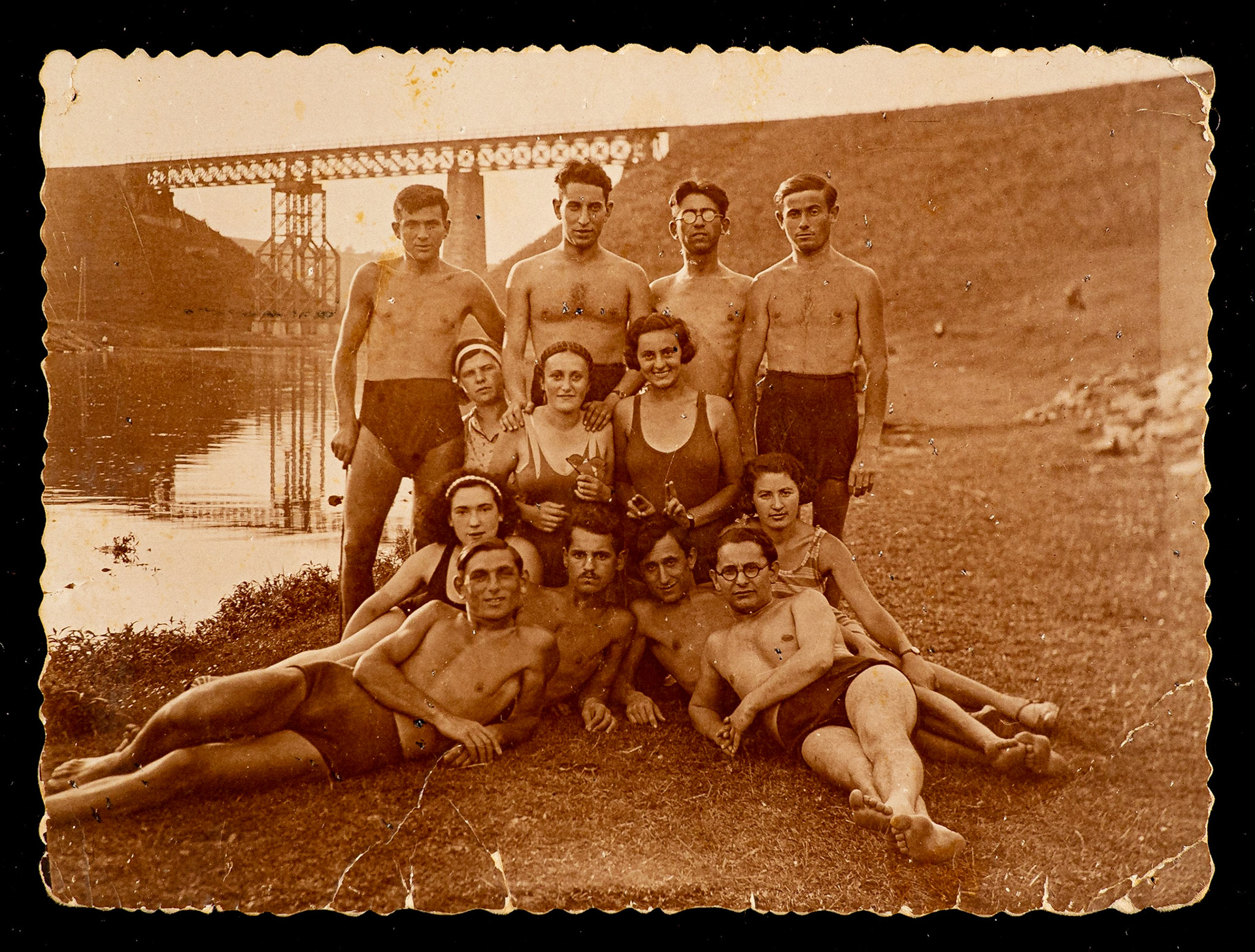
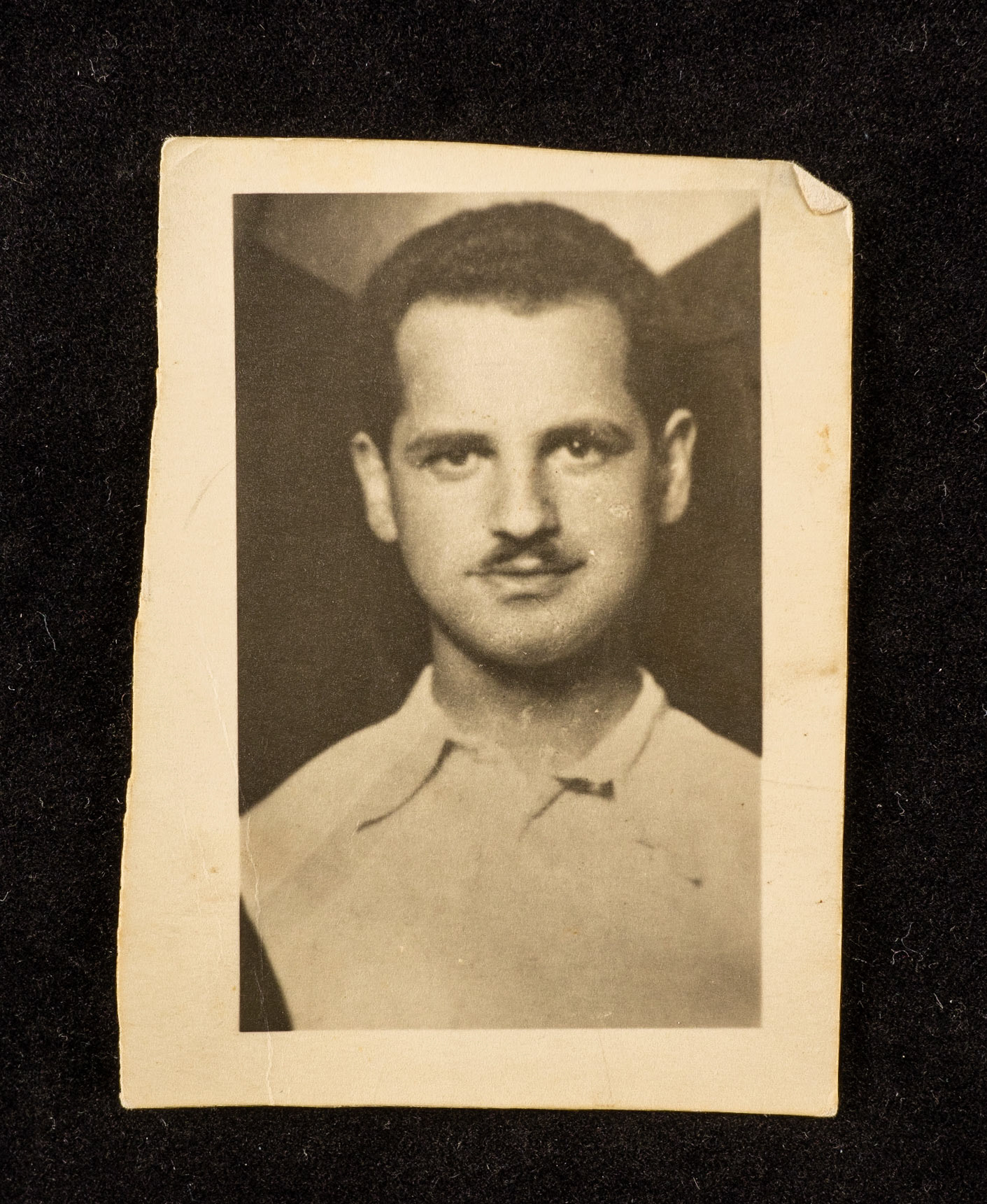
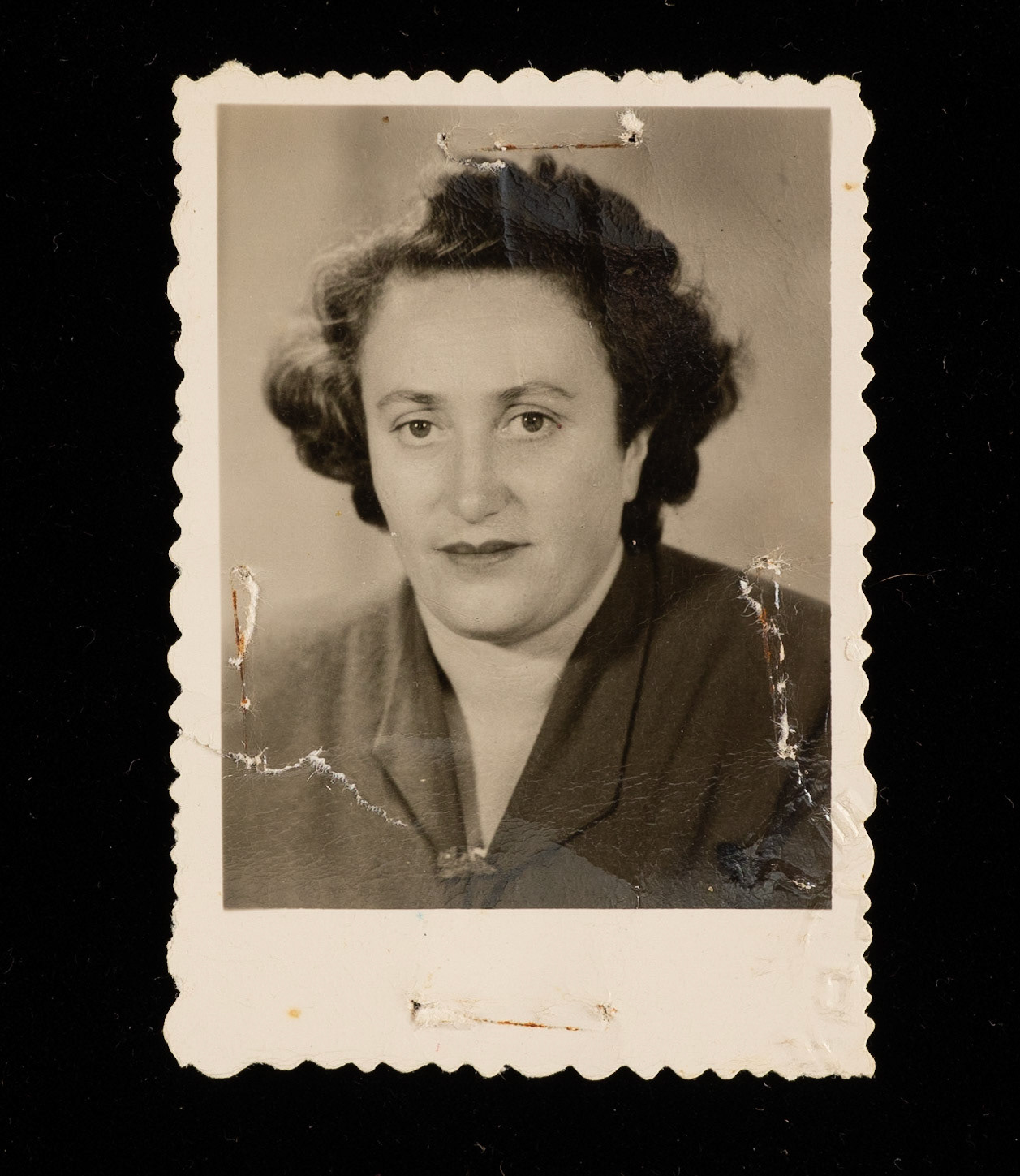
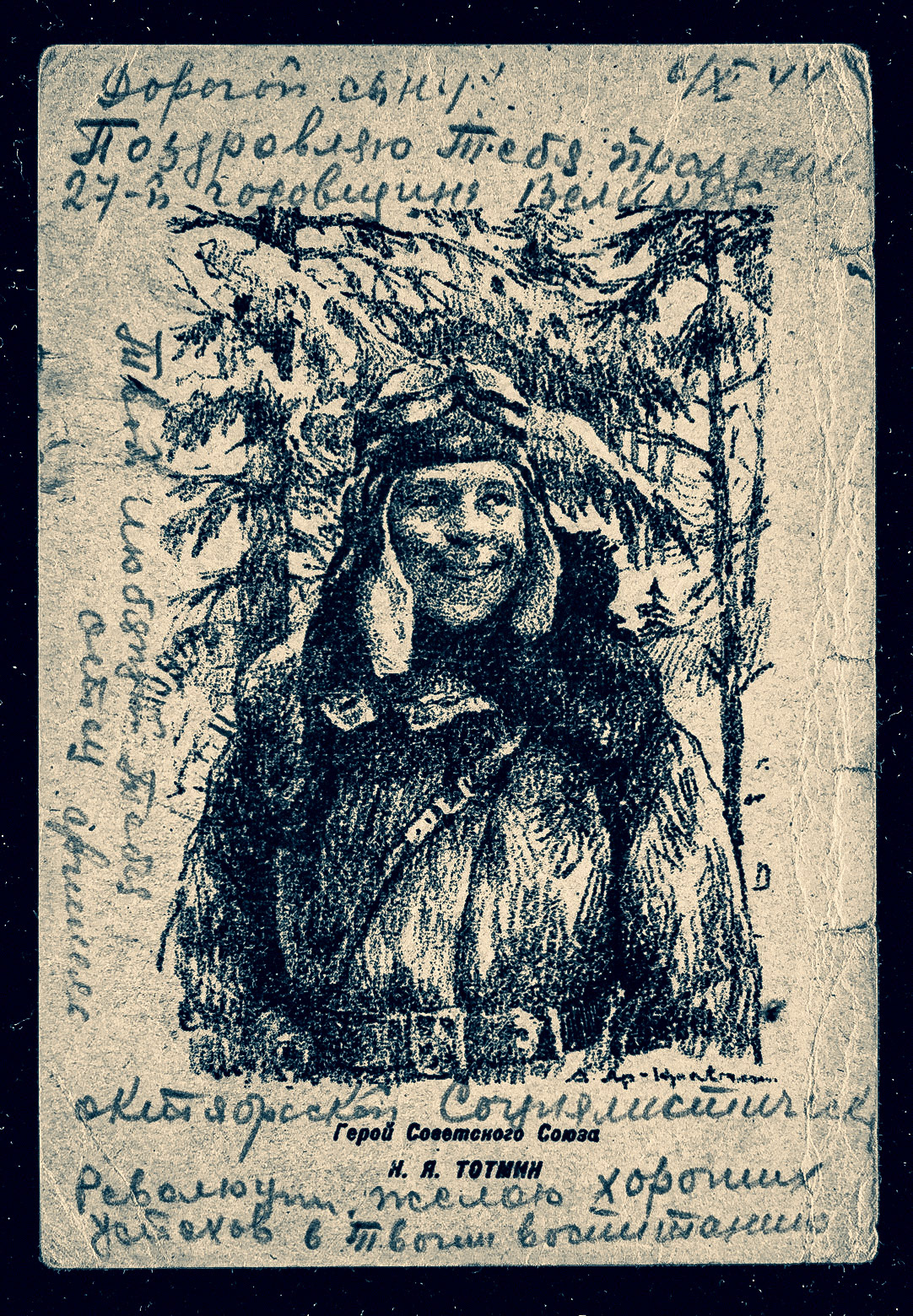
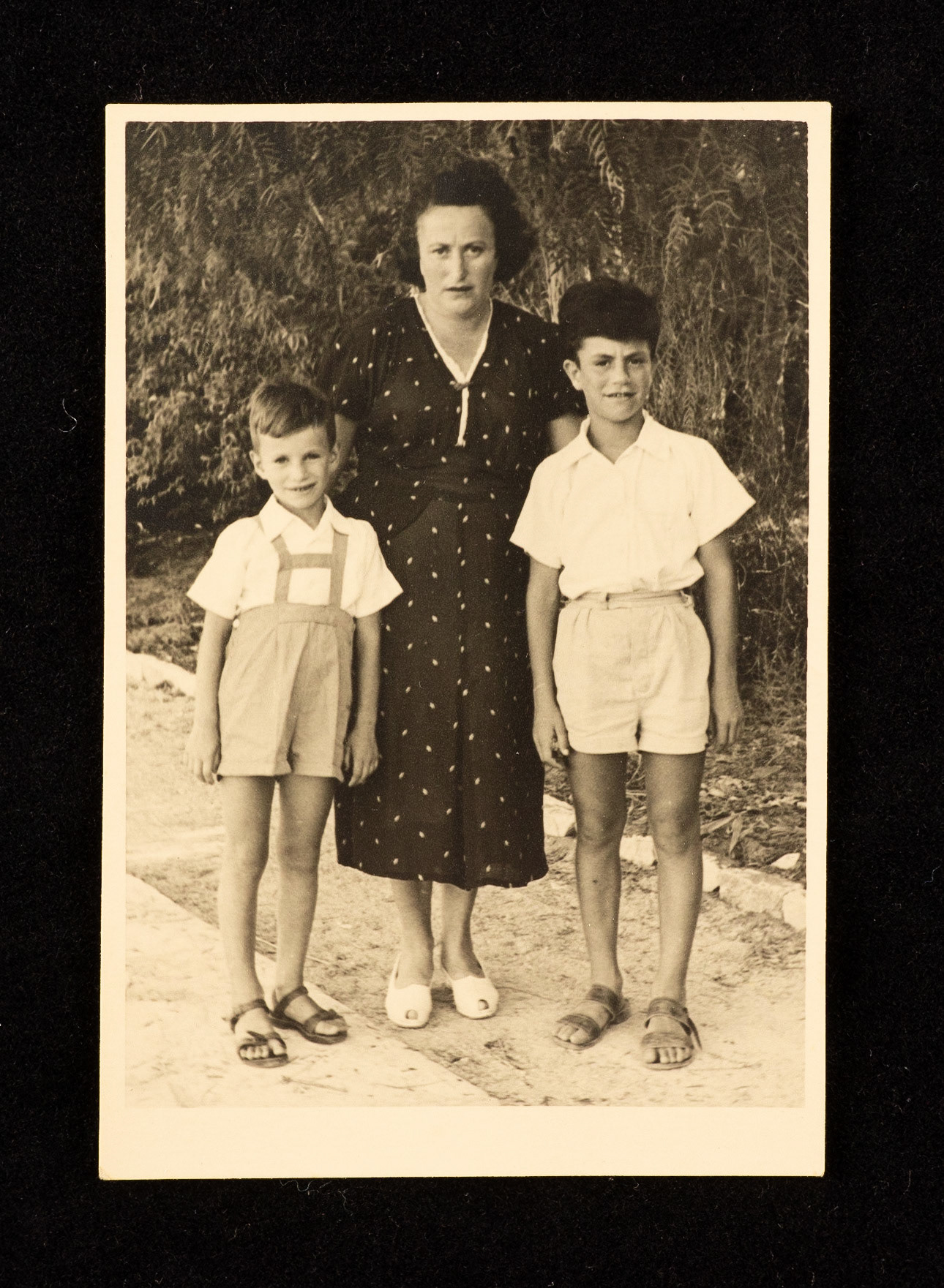
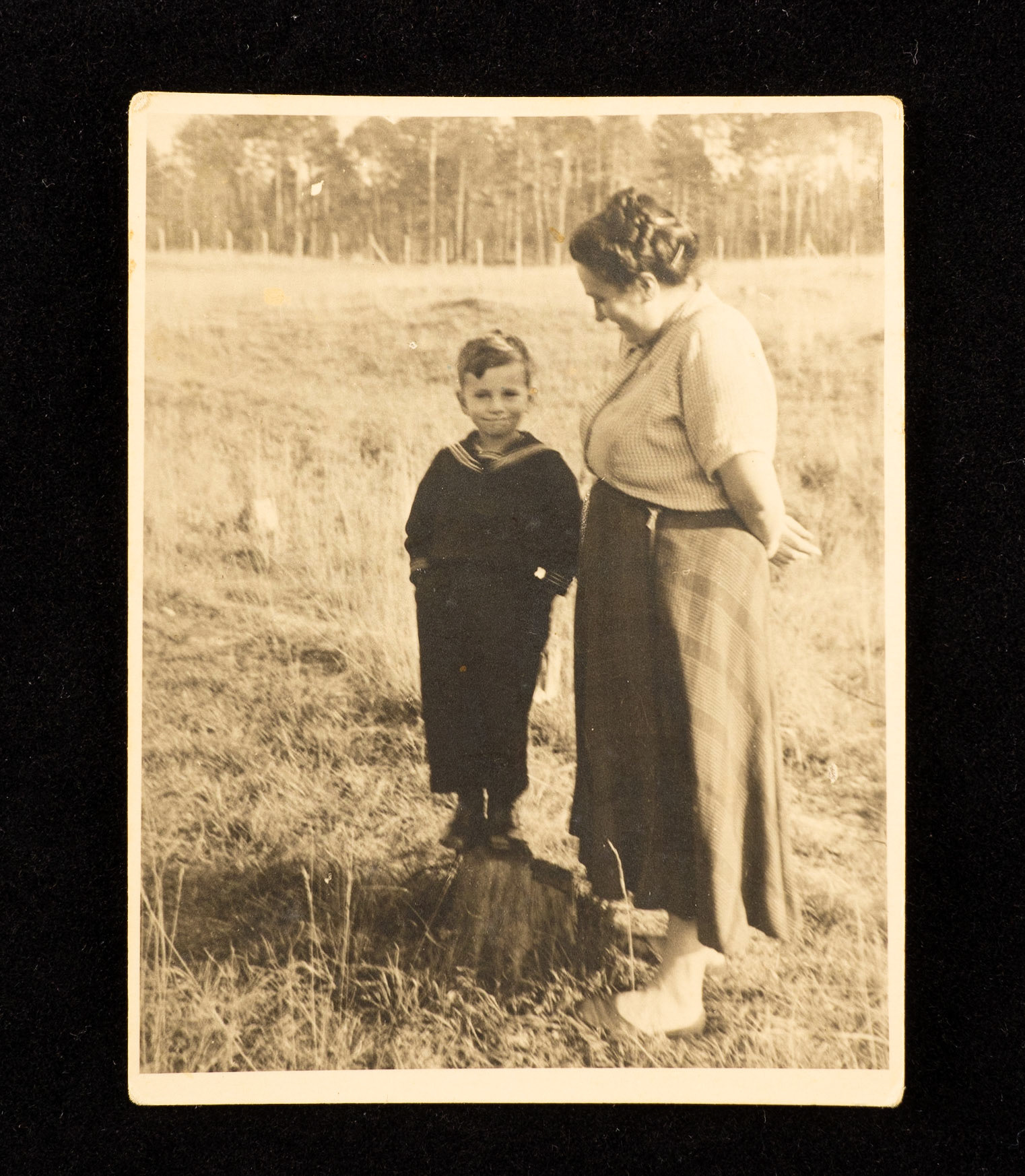
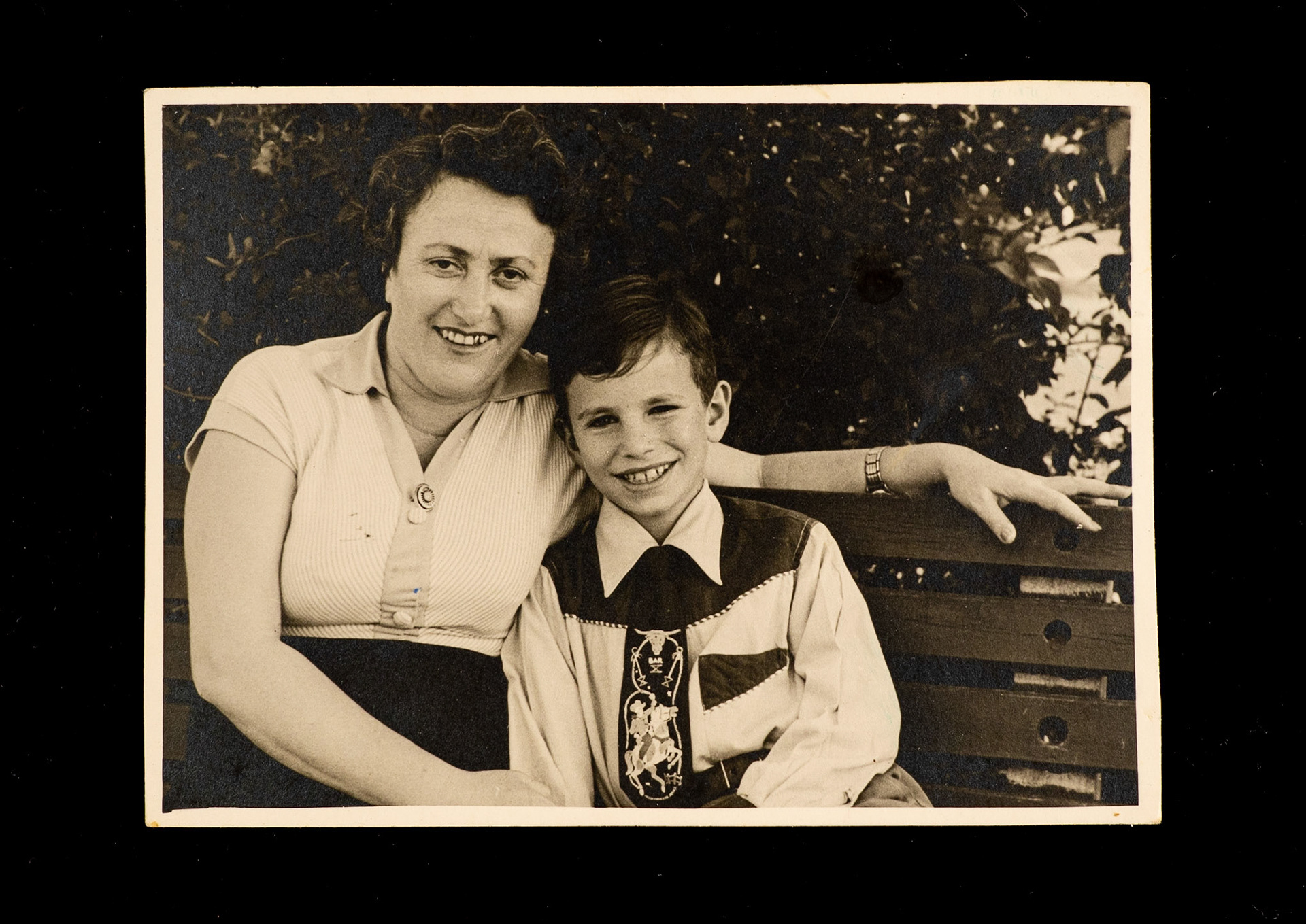
The Family’s Remarkable Backstory
Before the war, the client’s grandparents were part of the large Jewish population of a town called Buczacz (Buchach), which was then a part of Poland, now a part of Ukraine, near Ukraine’s Western border. In 1939, with the outbreak of WWII, the USSR occupied Buczacz. Then, in 1941, the Germans invaded and his grandfather (Fishel) and his grandmother (Zuzie) escaped just before the German army arrived. None of the >90% of Jews who stayed behind survived. Their son (the client’s father) was born at one of the train stops along their journey.
The postcards are what his grandfather Fischel wrote to his wife, Zuzie, who had settled in a city in the Ural Mountains. Tragically, the client’s grandfather was killed in battle just two months before the end of the war. This is why the chronology of the postcards suddenly stops. His grandmother and her children then embarked on a 3,000-mile journey across war-torn Europe, eventually landing in Israel.
The archive also tells the story of the client's grandmother. Hers was a story of extreme hardship, bravery, and survival. The client's grandmother had a mental breakdown while she and her two sons were on a train "back to Poland", shortly after the death of her husband and the surrender of the Germans. She was in and out of psychiatric hospitals for the rest of her life. Her son, the client's father, was placed in an orphanage before being reunited with his mother in Israel.
Photography and Editing
After Stephanie Johnson-Toliver of the Black Heritage Society referred the client to Visual Cognetics, we arranged to meet to discuss the project and review the state of the archive, a small collection of about 20 papers and untranslated documents.
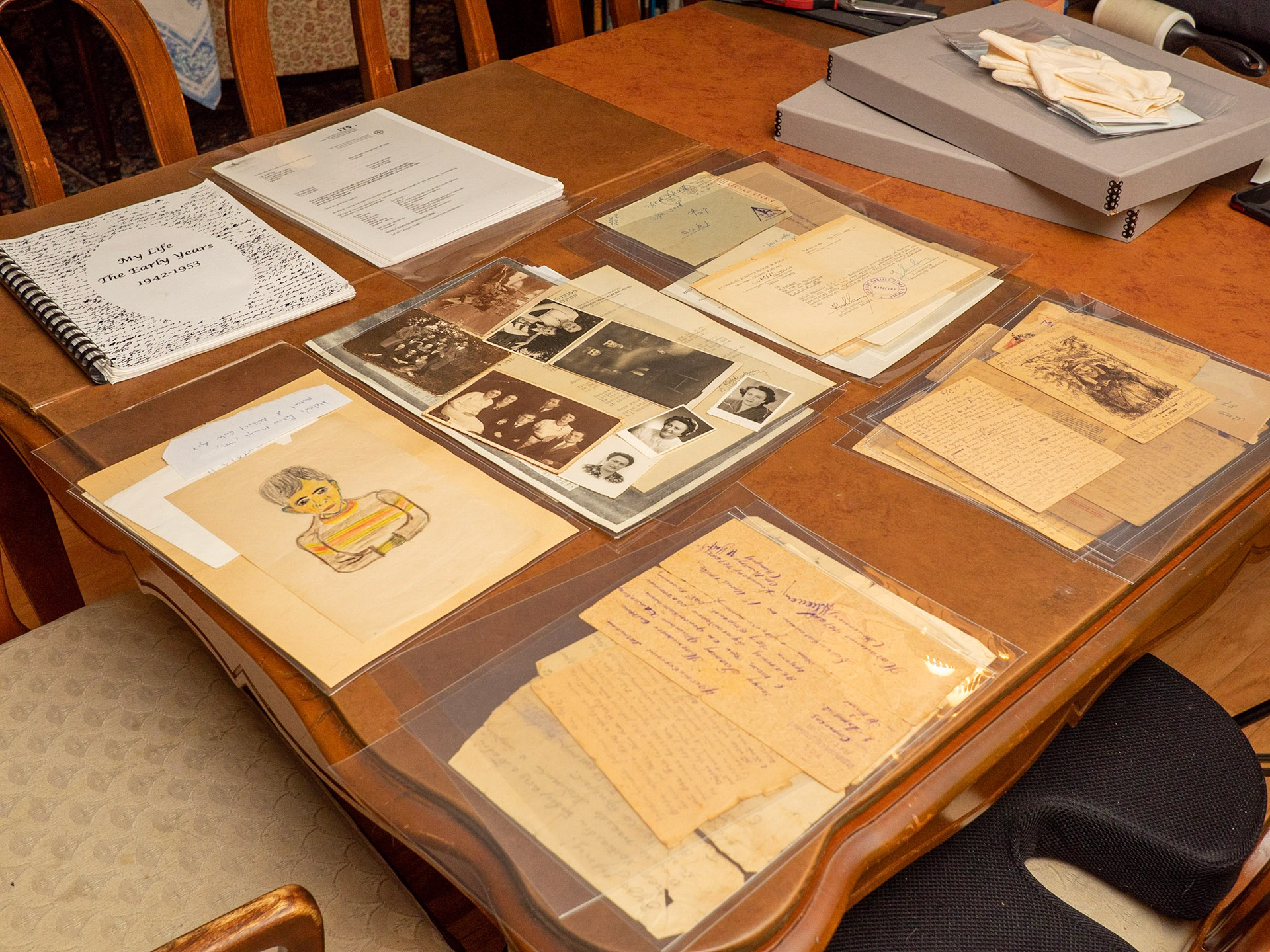
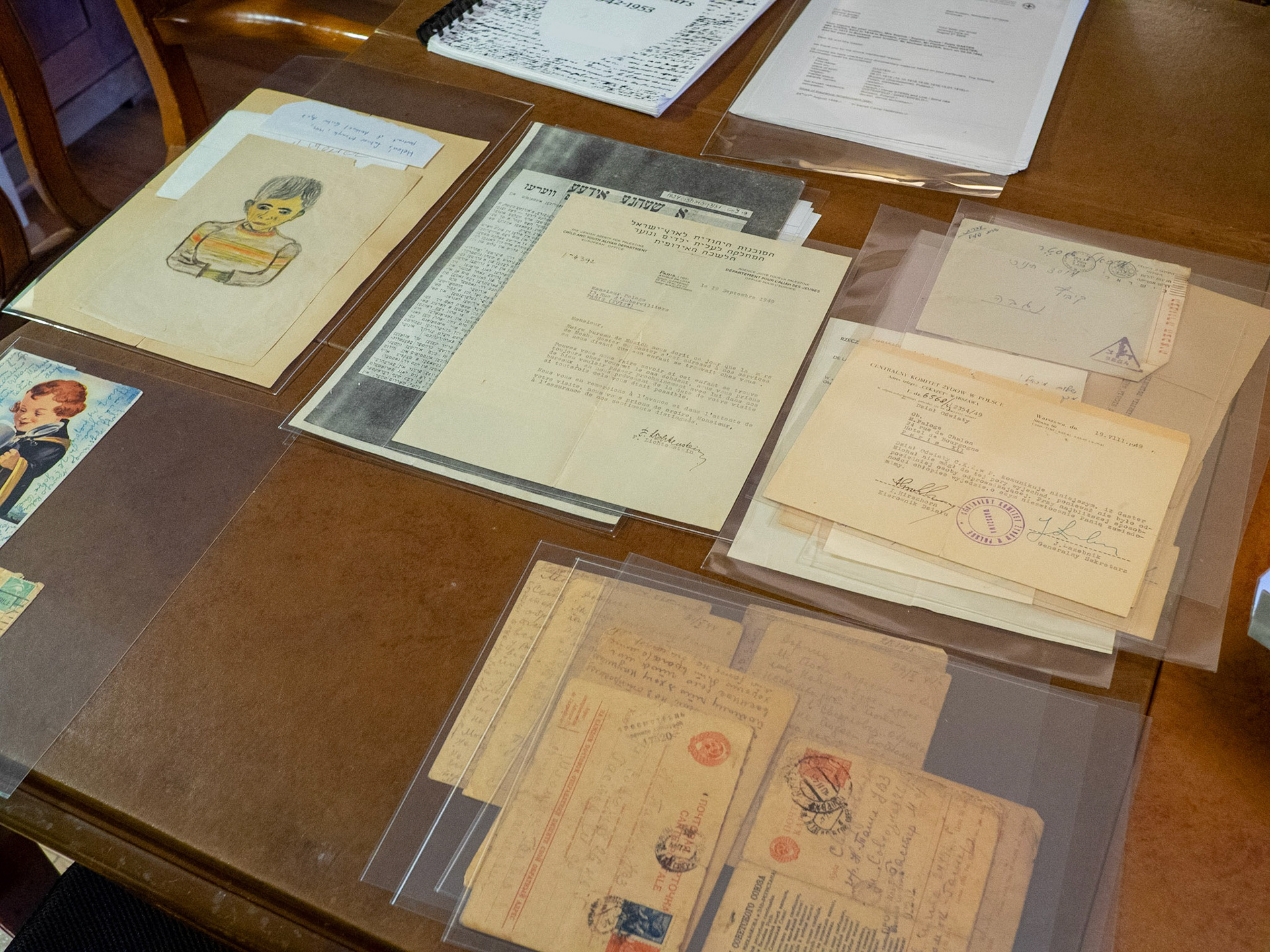
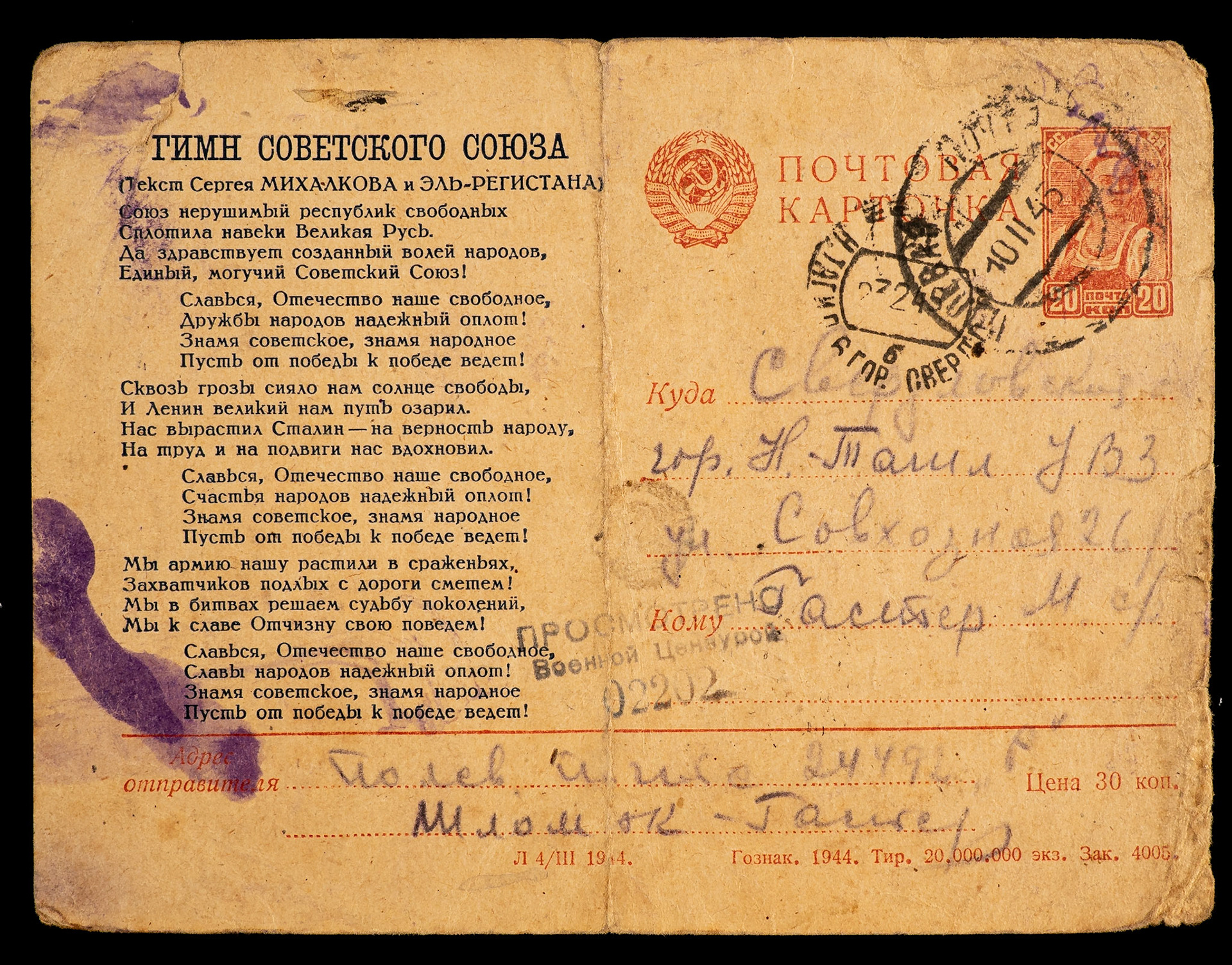
Below are a few examples of editing photos of documents for enhanced legibility, as well as documenting both sides where relevant:
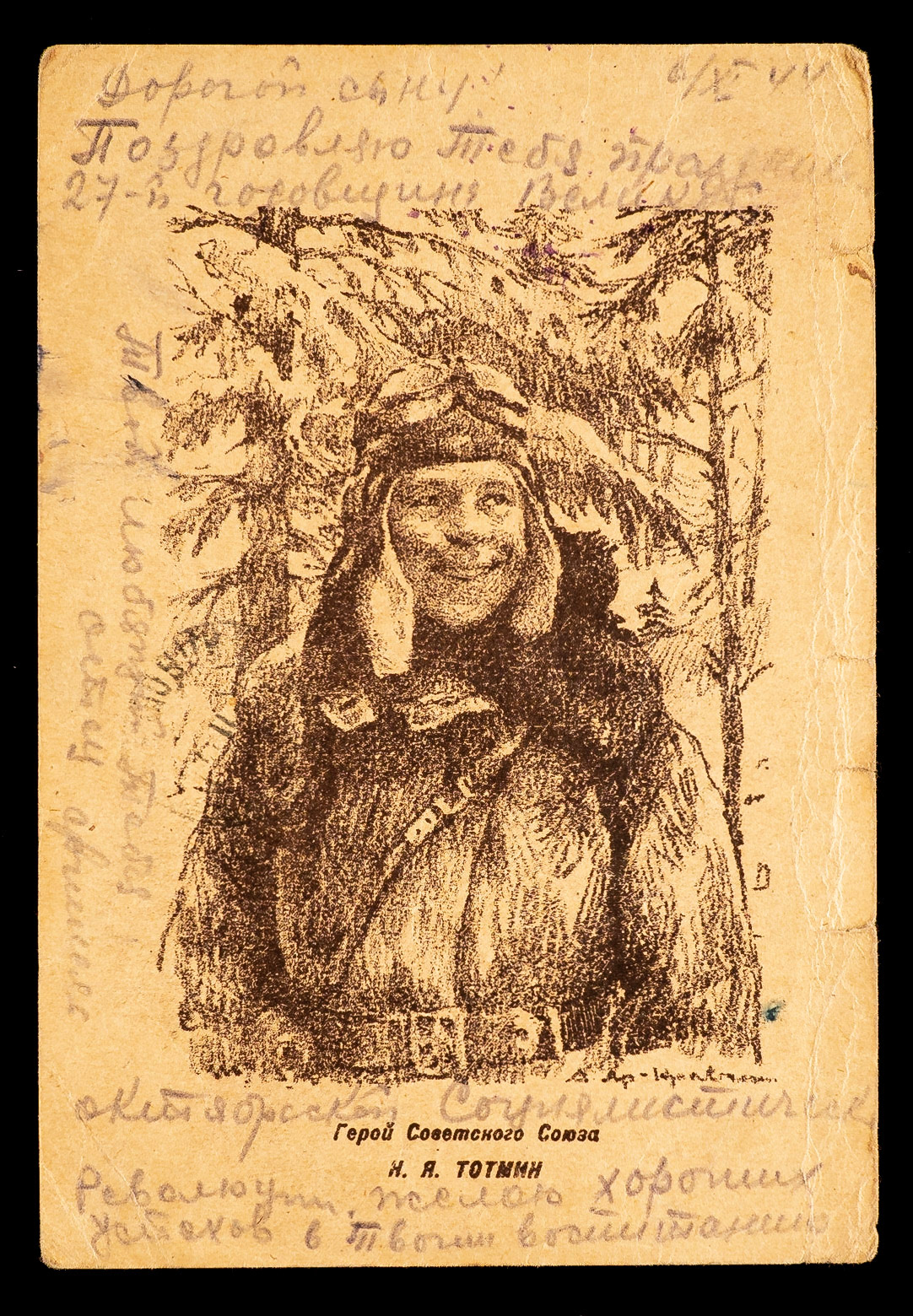
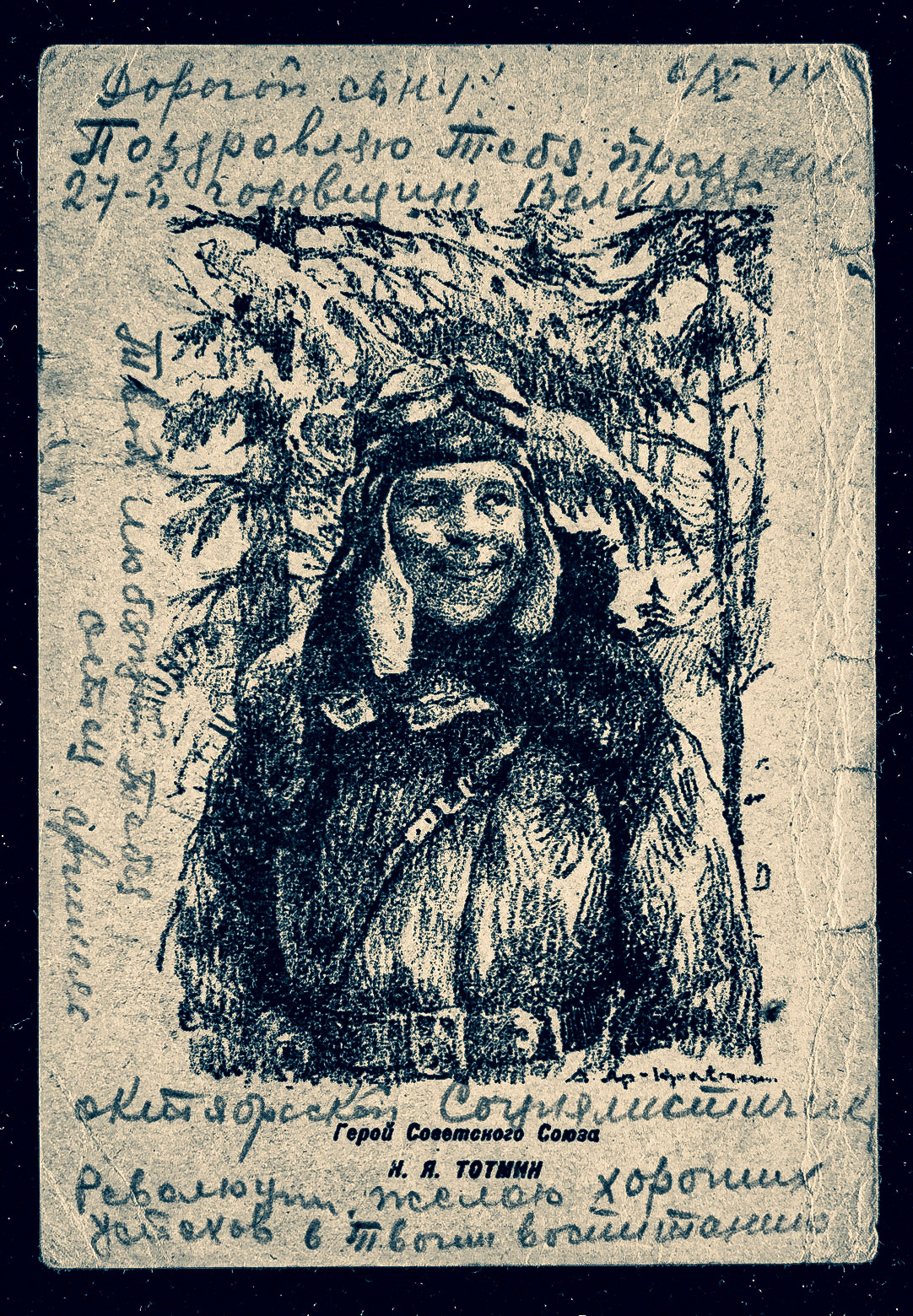
Translation:
11/06/1944
Dear son,
I congratulate you on the anniversary of the Great October Socialist Revolution, and I wish you every success in your studies and in your life.
Your loving father Fishel
I congratulate you on the anniversary of the Great October Socialist Revolution, and I wish you every success in your studies and in your life.
Your loving father Fishel
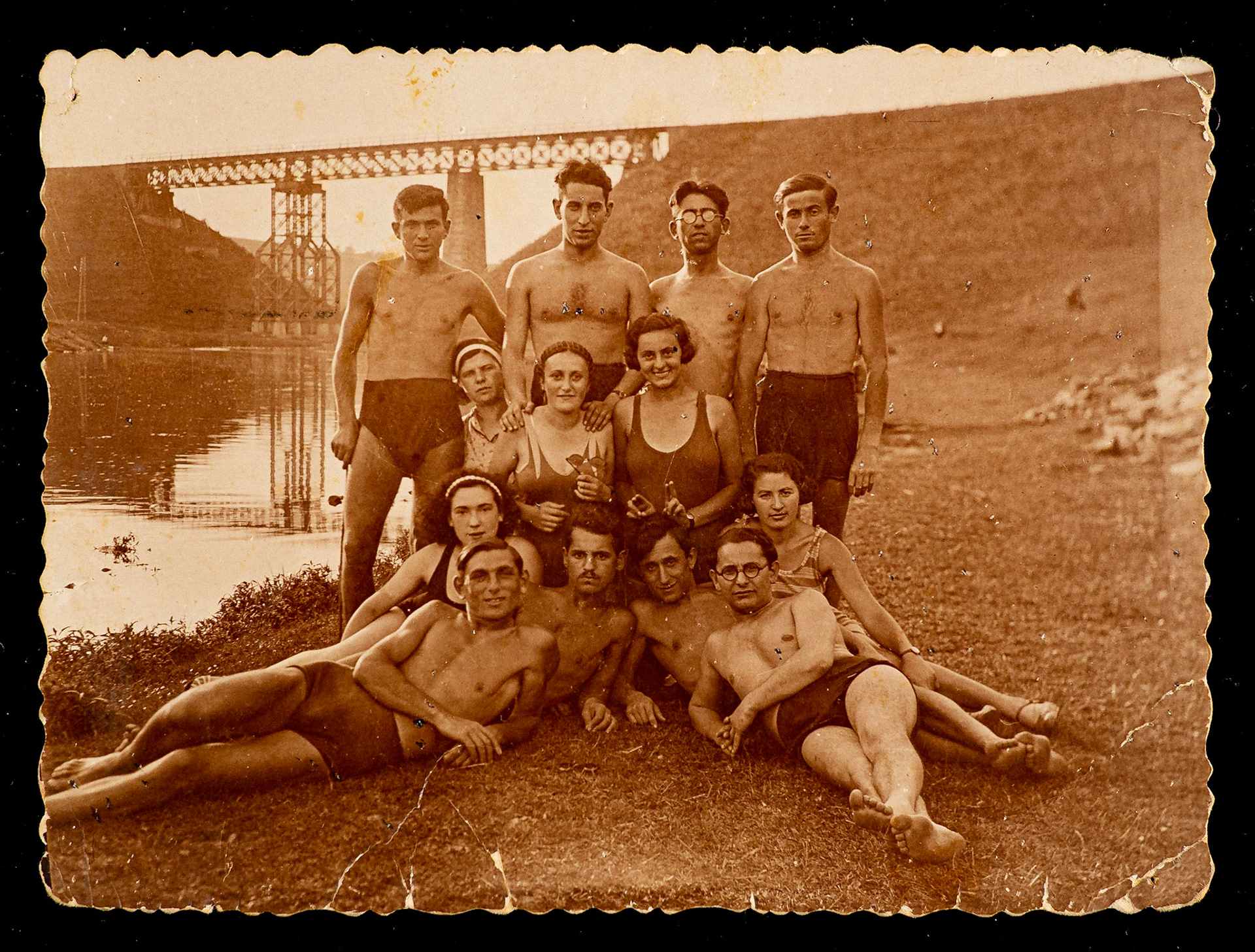
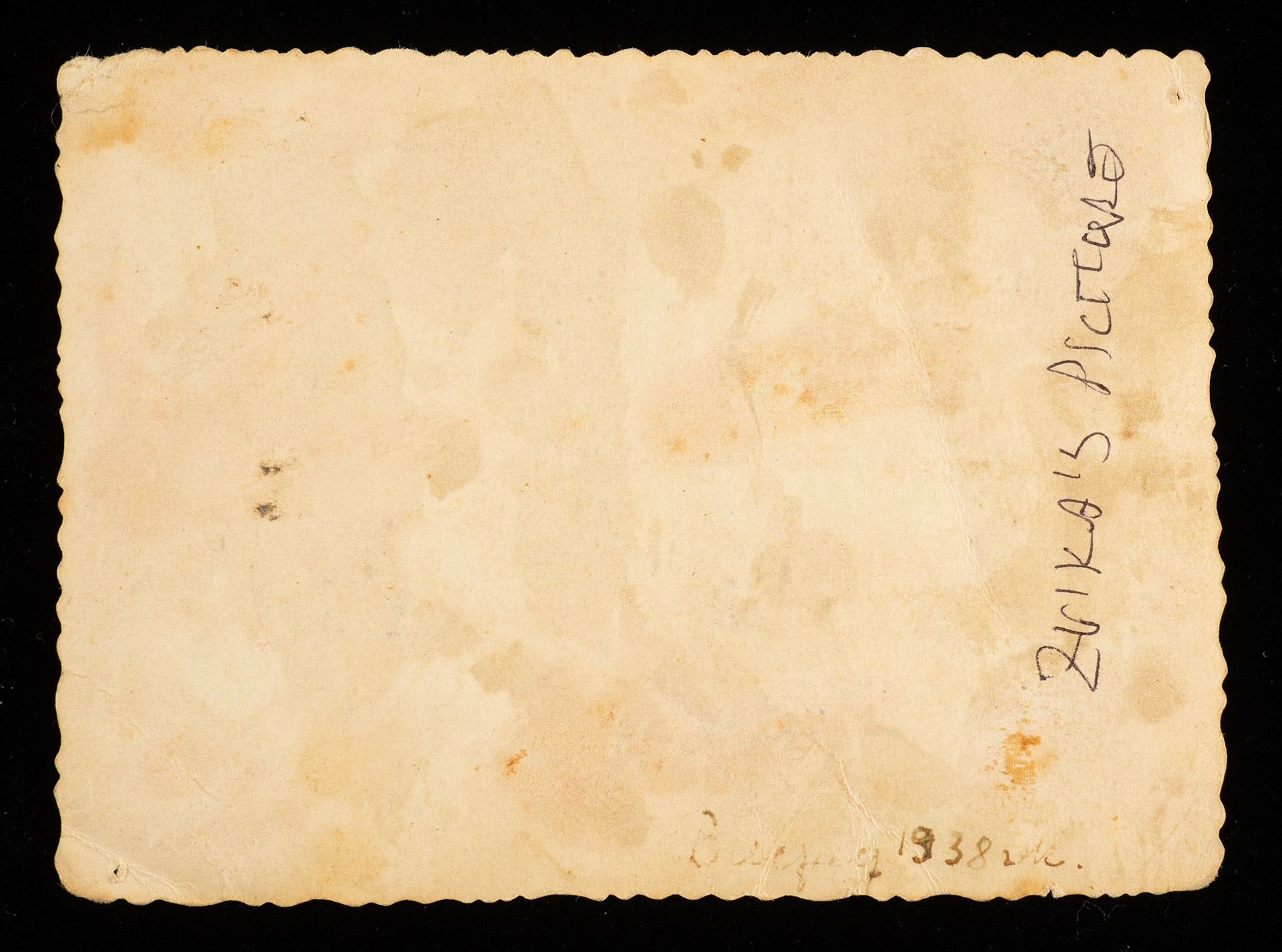
Front and back of a photo. Caption: Bucz--- 1938
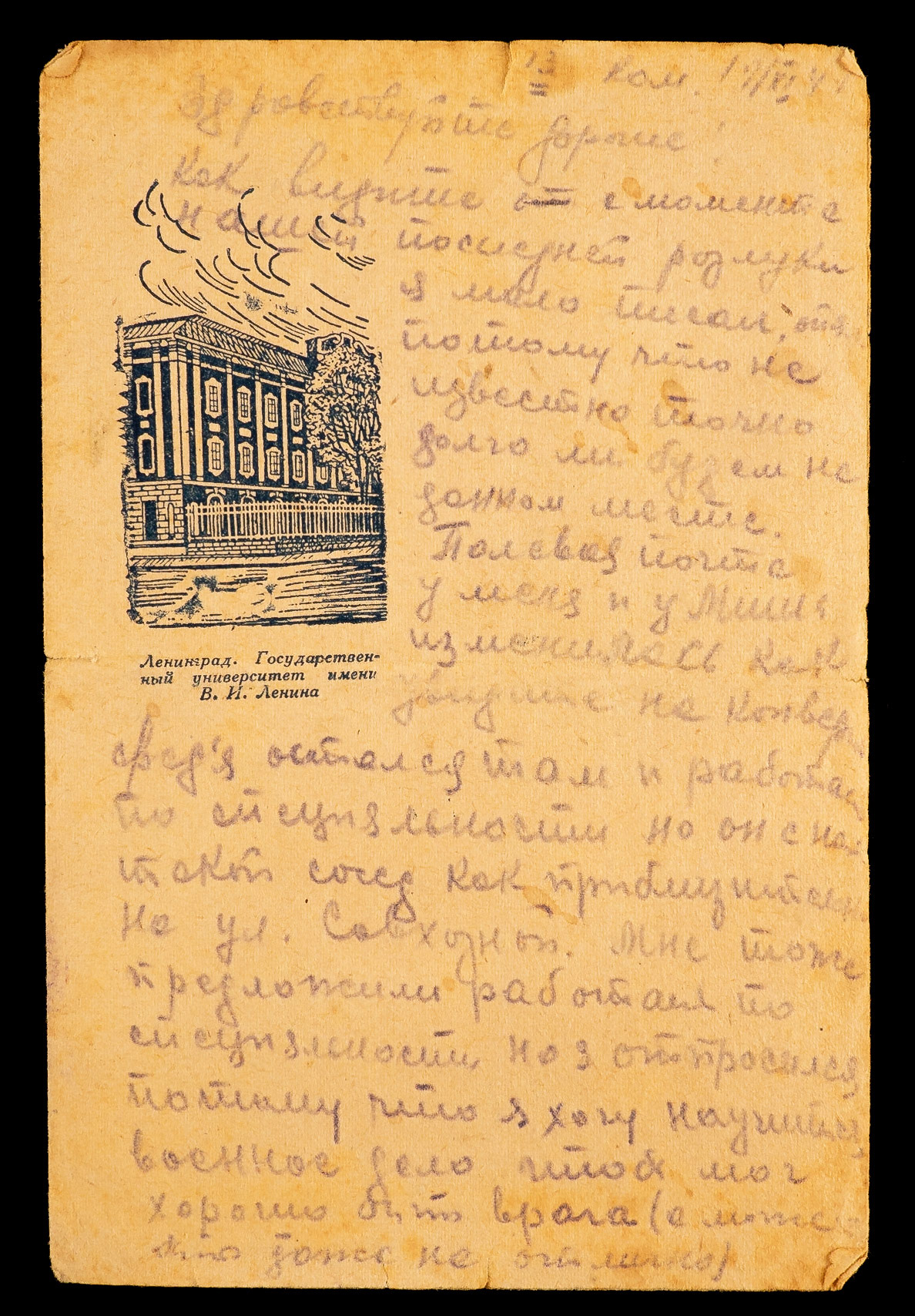
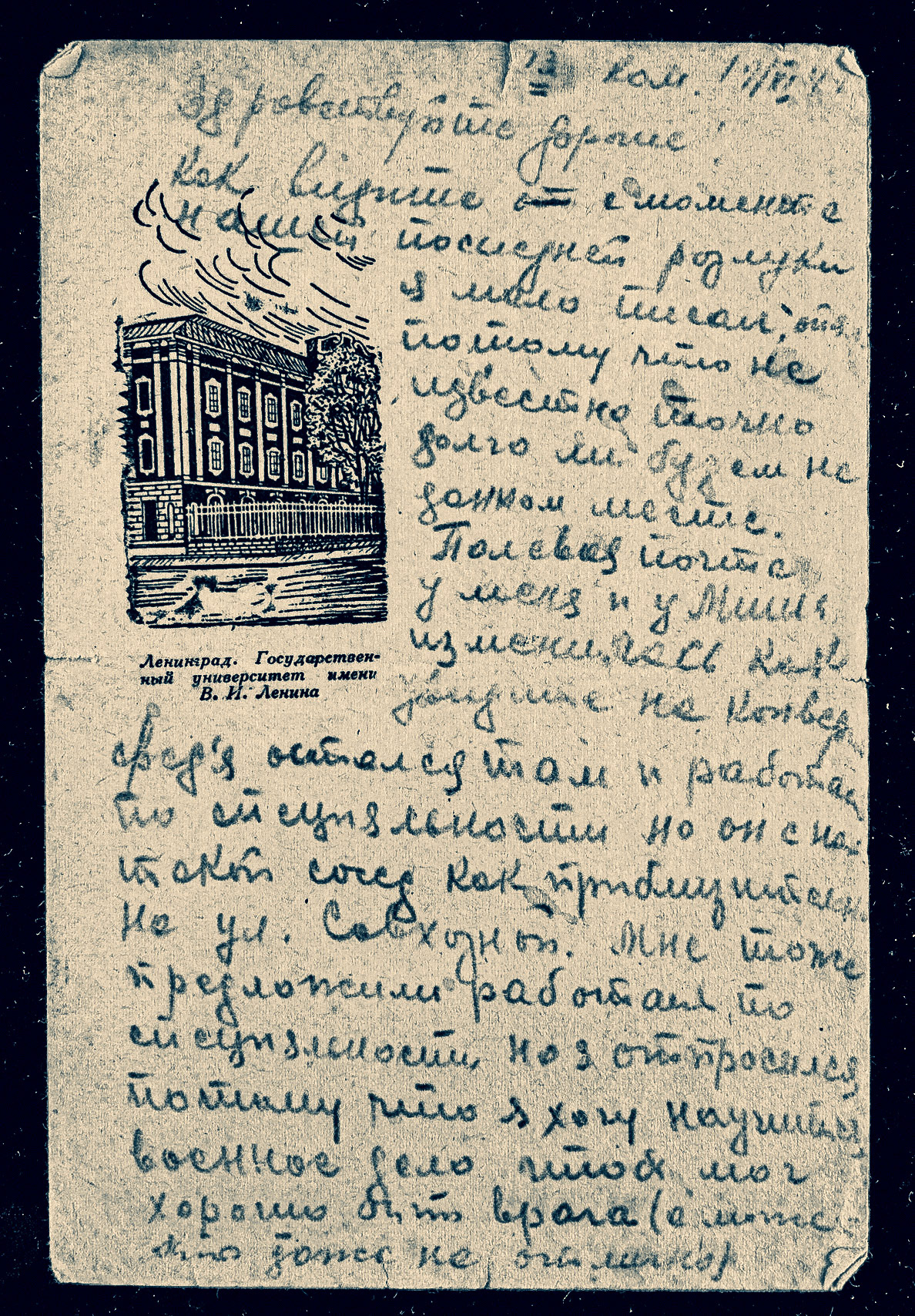
Translation:
11/19/1944
Hi my dears,
As you see, I haven't written to you a lot since we saw each other last because we don't know exactly how long we're going to stay here. My field mail address as well as Misha's has changed as you will see on the envelope.
Fedya has stayed there and works using his professional skills, but he is our neighbor about as close to us as he was on Sovkhoznaya street. I was also offered to work using my professional skills, but I refused because I'd like to get military skills to be able to fight the enemy well (and maybe very well).
As you see, I haven't written to you a lot since we saw each other last because we don't know exactly how long we're going to stay here. My field mail address as well as Misha's has changed as you will see on the envelope.
Fedya has stayed there and works using his professional skills, but he is our neighbor about as close to us as he was on Sovkhoznaya street. I was also offered to work using my professional skills, but I refused because I'd like to get military skills to be able to fight the enemy well (and maybe very well).
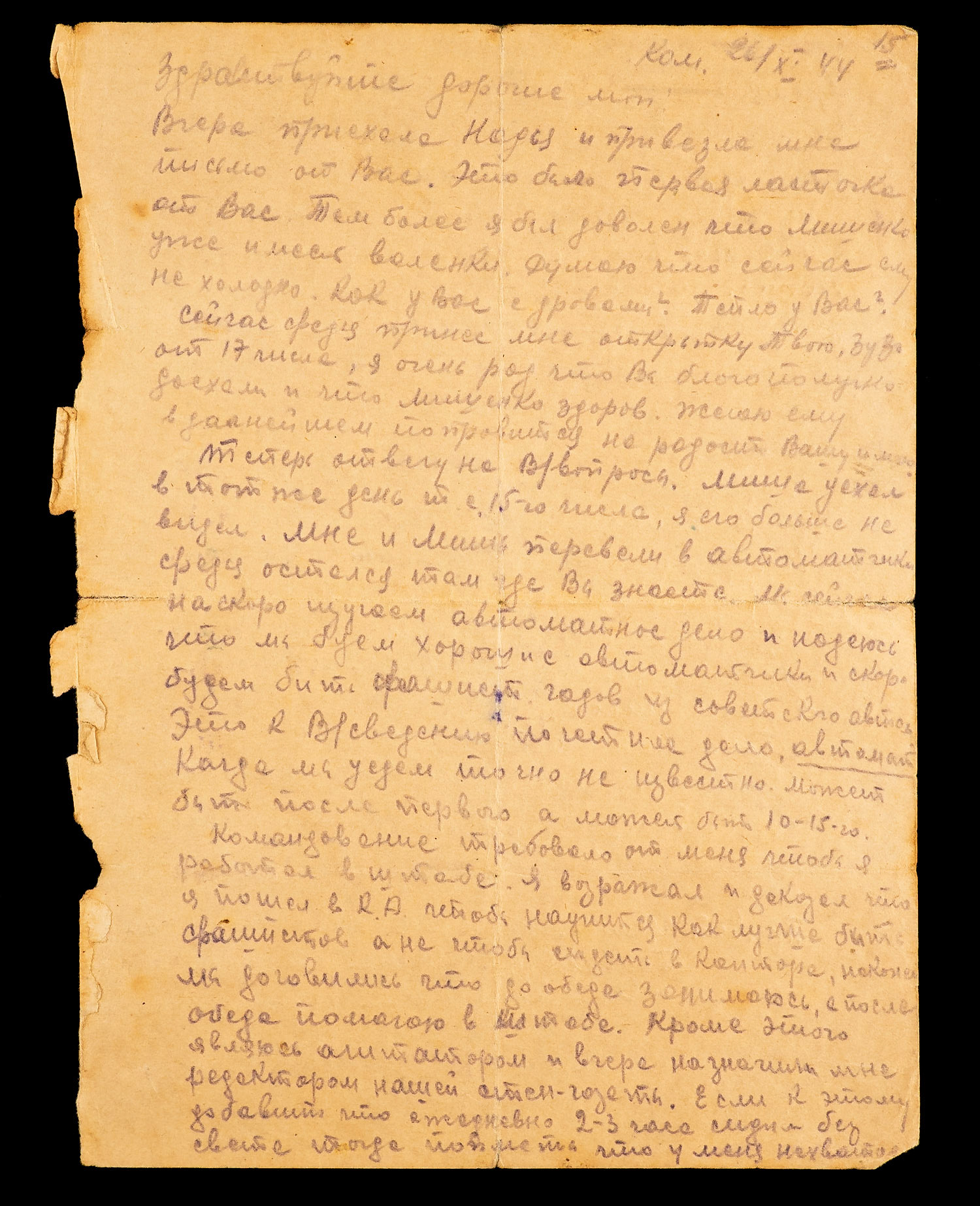
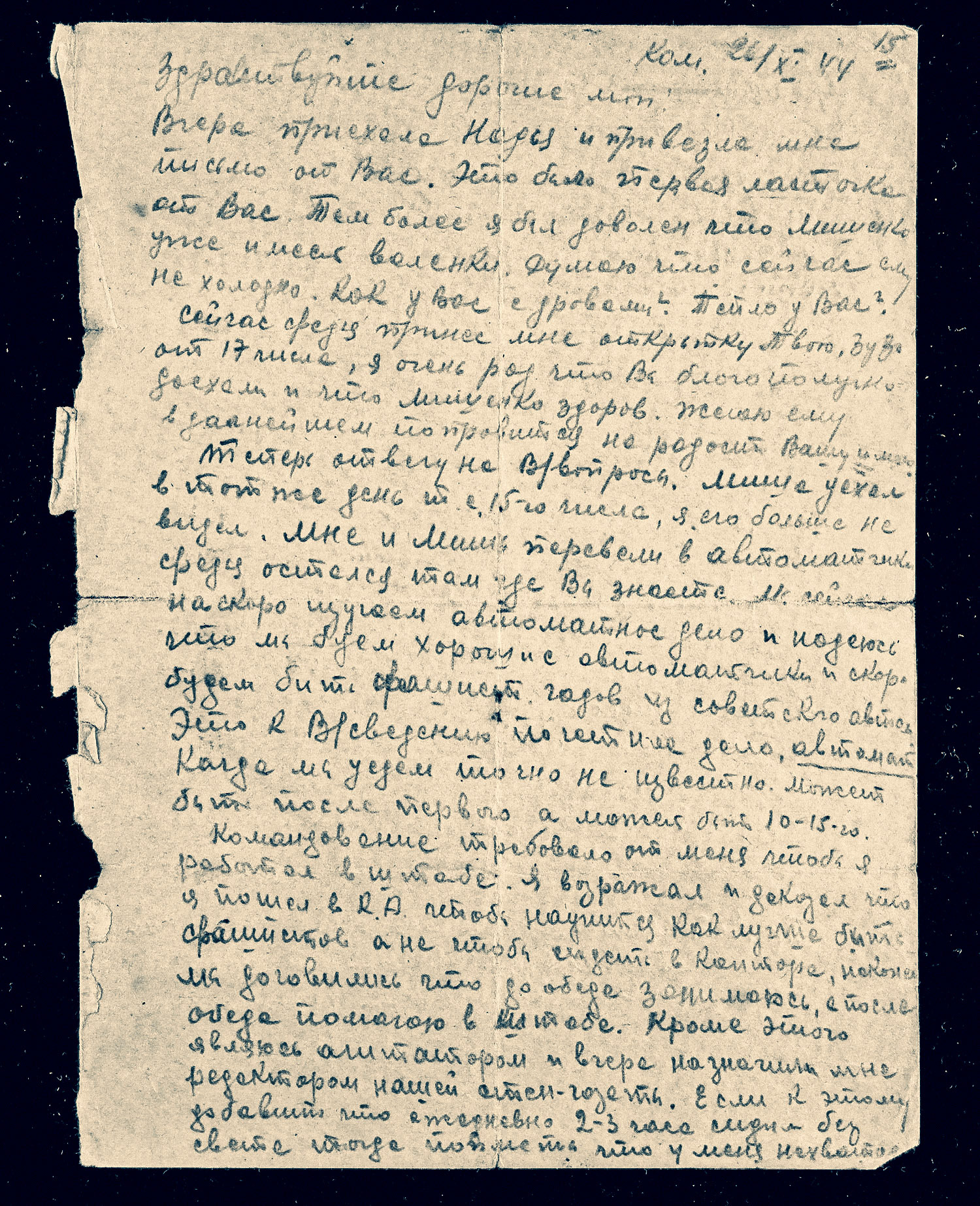
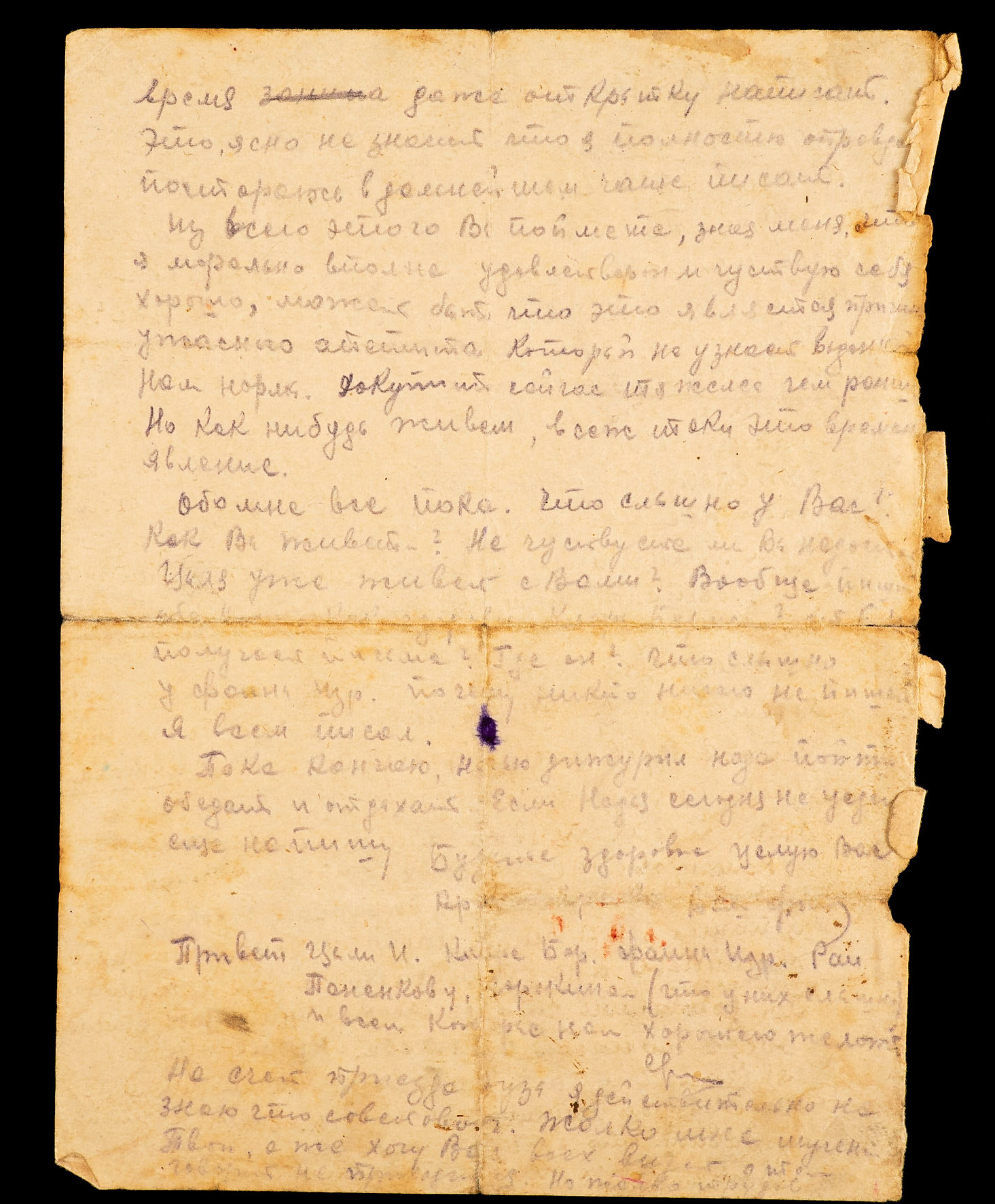
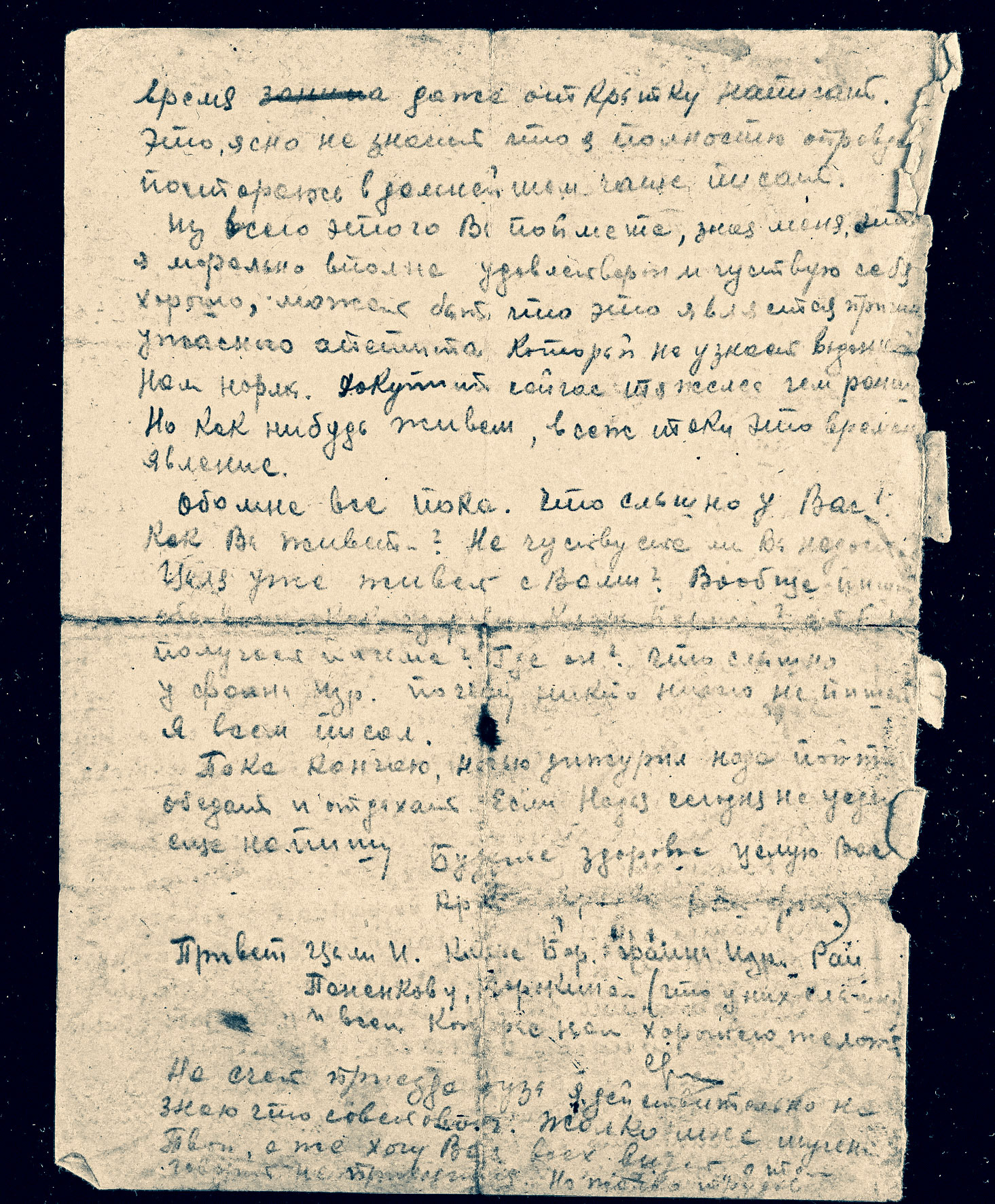
Translation, front and back:
11/26/1944
Hello, my dears,
Yesterday Nadya came and brought me a letter from you. It was the first message from you and, hopely, not the last. I am very glad Mishenka has gotten felt boots. I think he doesn't feel cold anymore. Do you have firewood? Is it warm enough in your house? Zuza, Fedya has just brought me your postcard written on November 17. I'm very glad that you are safely back home and that Mishenka is in good health. I wish he got better soon to make you and me happy. Now for your questions. Misha left on that very day, November 15; and I haven't seen him since then. Misha and I have become members of the submachine gunners' group, and Fedya has stayed you know where. We are learning submachine gunner skills very quickly. I hope we'll become good submachine gunners and will be able to fight fascist bastards using Soviet submachine guns. For your information, it's very honorable to be a submachine gunner.
It's unknown when we'll leave. Maybe after December 1 or December 10 to 15.
My commanders demanded I work at the headquarters. I objected and said that I had joined the Red Army to learn how to fight the fascists better but not to sit in the office. As a result, we decided that I would learn military skills before lunch and help at the headquarters after lunch. Besides, I am an agitator, and yesterday I was appointed editor of our wall newspaper. If I add that we have power outages for 2 to 3 hours daily, you will understand that I don't have enough
============================
Yesterday Nadya came and brought me a letter from you. It was the first message from you and, hopely, not the last. I am very glad Mishenka has gotten felt boots. I think he doesn't feel cold anymore. Do you have firewood? Is it warm enough in your house? Zuza, Fedya has just brought me your postcard written on November 17. I'm very glad that you are safely back home and that Mishenka is in good health. I wish he got better soon to make you and me happy. Now for your questions. Misha left on that very day, November 15; and I haven't seen him since then. Misha and I have become members of the submachine gunners' group, and Fedya has stayed you know where. We are learning submachine gunner skills very quickly. I hope we'll become good submachine gunners and will be able to fight fascist bastards using Soviet submachine guns. For your information, it's very honorable to be a submachine gunner.
It's unknown when we'll leave. Maybe after December 1 or December 10 to 15.
My commanders demanded I work at the headquarters. I objected and said that I had joined the Red Army to learn how to fight the fascists better but not to sit in the office. As a result, we decided that I would learn military skills before lunch and help at the headquarters after lunch. Besides, I am an agitator, and yesterday I was appointed editor of our wall newspaper. If I add that we have power outages for 2 to 3 hours daily, you will understand that I don't have enough
============================
time even to write a postcard. It doesn't mean I'm trying to justify myself, I'll try to write more often.
Knowing me, from what I am writing you can understand that I am completely satisfied and feel well. This may be the reason for my great appetite. It's much more difficult to buy extra food than it was before. Yet, we manage to survive it as it is just a temporary thing.
This is all about me for now. How are you doing? Do you have any shortages? Does Tsilya already live with you? Anyway, write about everything. How is Clara Borisovna doing? Does she get letters from <...>? Where is he? What's going on with Faina Izrailevna? Why doesn't anyone write to me? I've written to everyone.
That's all for now. Now it's my turn to be on duty, and then I'll have lunch and get some rest.
Stay healthy. I kiss you very hard.
Your Fishel
Greetings to Tsilya Izrailevna, Clara Borisovna, Raya, Ponenkov, Vorskina (how are they doing?), and to all who wish us well.
Fishel
As for Guz's coming, I don't know what to say. I am sorry you have to live through so many hardships, and there's no need to say how much I'd like to see you all. Yet, how much trouble.
==========================
Knowing me, from what I am writing you can understand that I am completely satisfied and feel well. This may be the reason for my great appetite. It's much more difficult to buy extra food than it was before. Yet, we manage to survive it as it is just a temporary thing.
This is all about me for now. How are you doing? Do you have any shortages? Does Tsilya already live with you? Anyway, write about everything. How is Clara Borisovna doing? Does she get letters from <...>? Where is he? What's going on with Faina Izrailevna? Why doesn't anyone write to me? I've written to everyone.
That's all for now. Now it's my turn to be on duty, and then I'll have lunch and get some rest.
Stay healthy. I kiss you very hard.
Your Fishel
Greetings to Tsilya Izrailevna, Clara Borisovna, Raya, Ponenkov, Vorskina (how are they doing?), and to all who wish us well.
Fishel
As for Guz's coming, I don't know what to say. I am sorry you have to live through so many hardships, and there's no need to say how much I'd like to see you all. Yet, how much trouble.
==========================
Screenshot of the whole collection in Lightroom, including edited, high-contrast copies of letters and postcards to ease translation
Translation
The client already had rough translations of the letters (from Russian to English) but wanted to improve them. His grandfather’s native languages were Polish and Yiddish, but letters had to be written in Russian so they could be reviewed by Soviet-army censors. As a result, some of the wording in Russian was stilted, and the client was hoping to find a translator who could accurately preserve the layers of meaning within the documents.
Visual Cognetics managed the translation effort, done by Michael and Alla Aronov, with translations being added directly to the metadata in Lightroom so they will attach permanently to the images.
We translated the texts and also determined familial relationships, event locations, and timelines. The chronology presented not only a view of the family’s personal odyssey, but also a glimpse into the war as the Soviet army pushed the Germans westward.
The story of the Jews who stayed behind and were murdered was part of Fishel's motivation to join the Soviet army. These murders, which have been referred to as the "Holocaust by Bullets" (click for maps) occurred throughout Eastern Europe.
Additional documents traced the remaining family’s history throughout Europe and eventually to Israel and the United States.
Through his postcards, the client's grandfather shares updates on the progress of the war, mentioning the liberation of Warsaw from the Germans and the success of the Soviet troops. He expresses his hope for a peaceful future and his desire to be reunited with his loved ones. Despite the hardships and uncertainties, his letters reflect his resilience, dedication, and love for his family.
Within the Lightroom album, clicking the [i] icon on the right-hand side opens a panel with metadata about the photo, including translated English text and commentary about historical/linguistic context.
Family Collaboration
The project involved the client's family in an intimate way as they collaborated to discuss their understanding of the timeline and identify people in photographs. Through this process they were able to work through questions from the past.
Within Adobe Lightroom, clicking the “comment” speech balloon icon opened a panel where people with access to the album added details they remembered, such as identifying who is who in a photo or recalling who made a drawing (see below).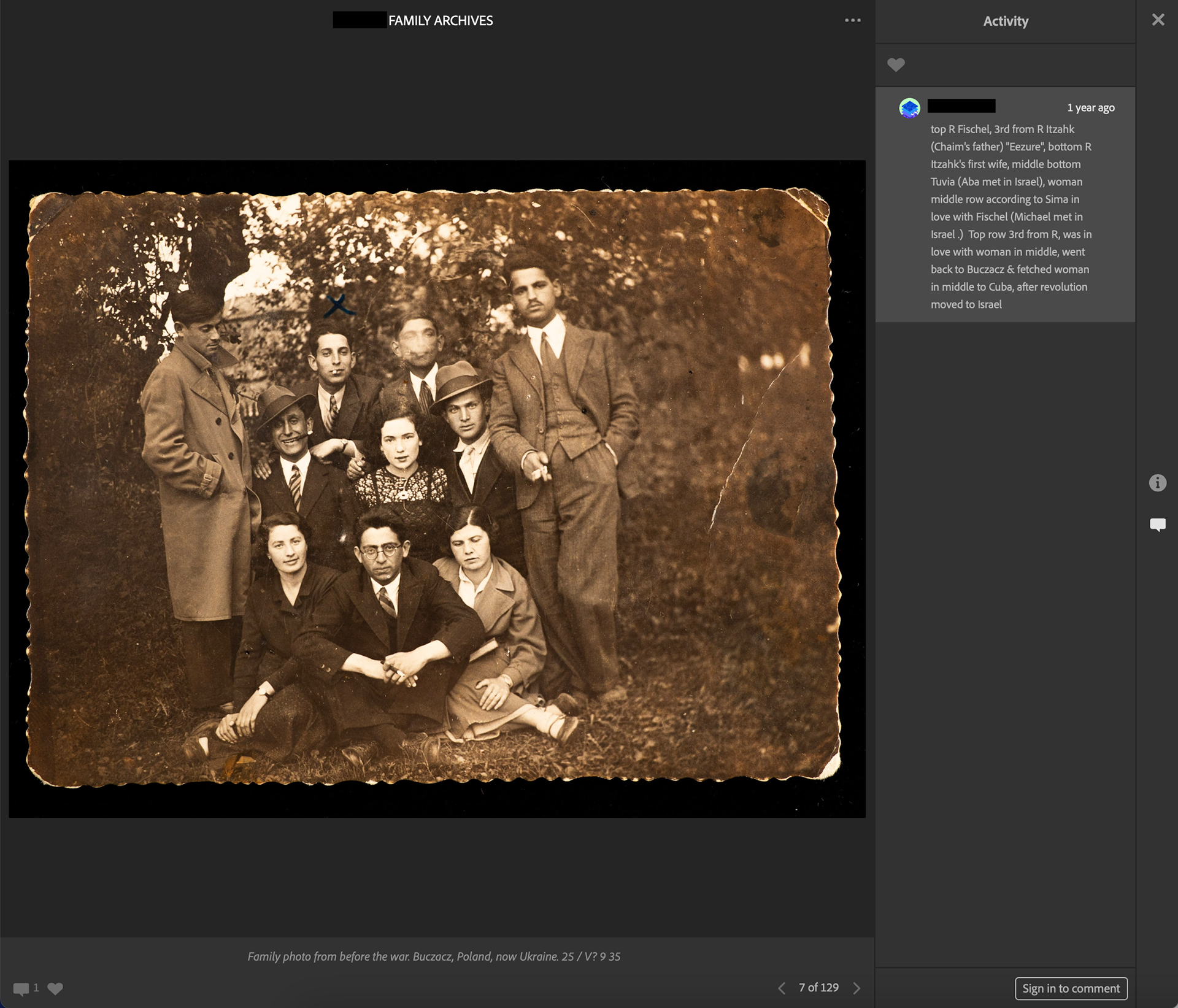
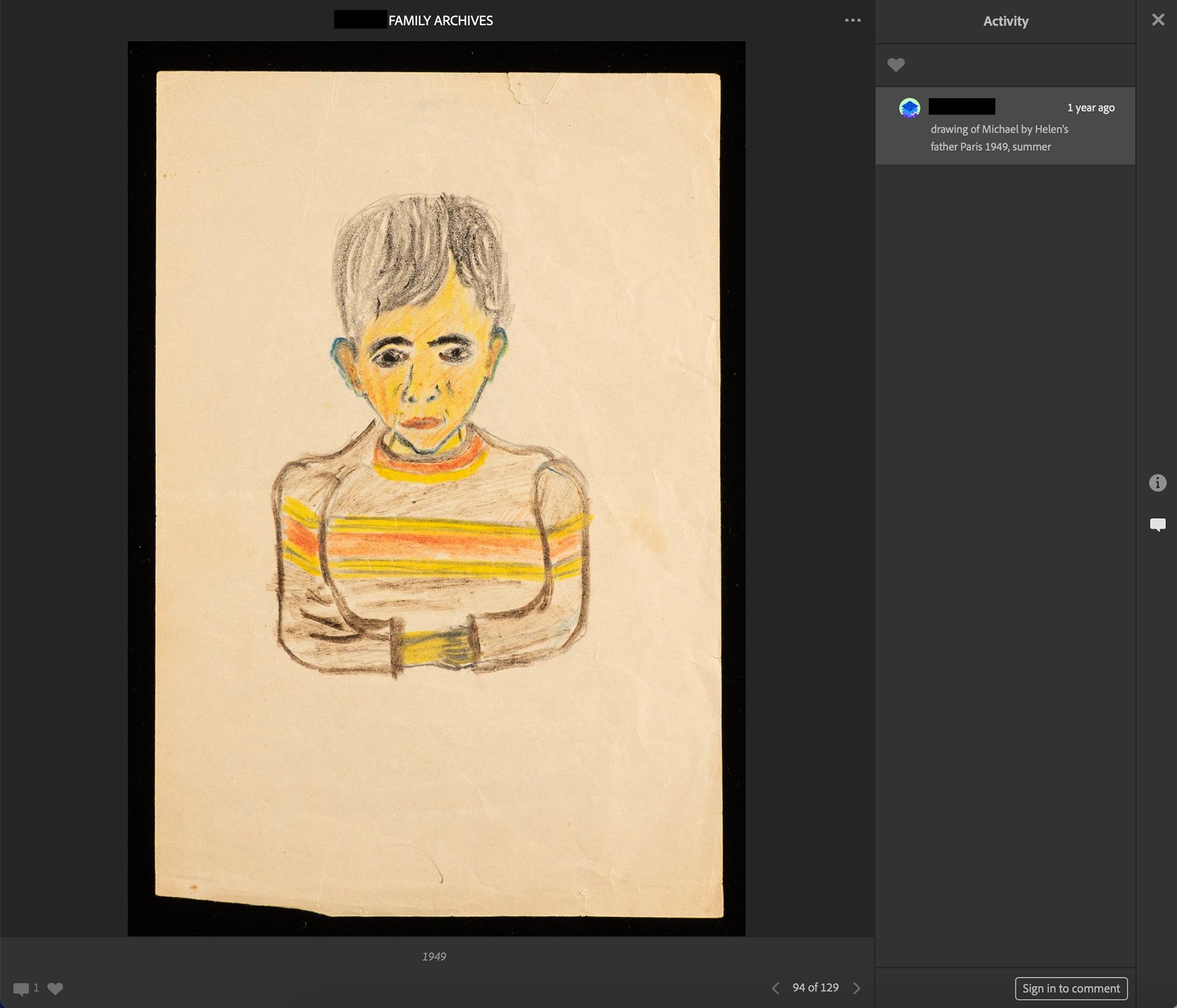
Examples of commentary from family members within Lightroom
Outcome
The project focused the client and his family to compile their knowledge and preserve their story for future generations. The family now has a permanent version of the postcards and letters, with accurate translations. The client used this information to create an online presentation called "Postcards from my Grandfather, 1944 - 1945" (which we have permission to share). Check it out if you want to learn more about the family's story and read more translations.
The client now better understands his grandfather’s and his family’s life around the time of the Nazi invasion of Poland. This project brought him closer to his father and uncle by clarifying certain aspects of their past. It also brought into focus the immense challenges the family was up against. For his grandfather this meant bringing the family to relative safety, at the price of his life. For his grandmother this meant a life of sacrifice dedicated to seeking liberty for herself and her children. For his father and uncle, this meant enduring deep trauma and separations at a young age.
As this multi-generational, war-torn struggle came to an end, the father and uncle were eventually reunited at a kibbutz in Israel, where they formed a strong and lasting bond.
Thank You
The (anonymous) client and their family, for your trust in us to embark on this project, your hard work to identify family members so their names could be included in the digitized collection's metadata for future generations, and for your assistance with understanding the history of the region.
Michael and Alla Aronov, for your expert translation of the post cards, and for sharing your knowledge of Russian culture and geography. Your contributions were essential.
Stephanie Johnson-Toliver of the Black Heritage Society, for referring the client to Visual Cognetics after our work together on the Pratt Legacy Project.